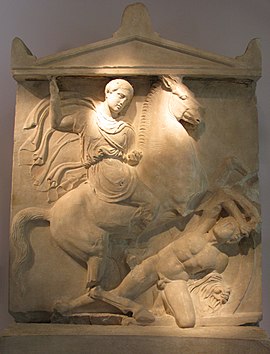
Back Korinthischer Krieg ALS الحرب القورنثية Arabic قرنتیان ساواشی AZB Коринтска война Bulgarian Guerra de Corint Catalan Korinthischer Krieg German Κορινθιακός Πόλεμος Greek Guerra de Corinto Spanish نبردهای کورنتیان Persian Korintin sota Finnish
| Corinthian War | |||||||||
|---|---|---|---|---|---|---|---|---|---|
| Part of the Spartan hegemony | |||||||||
 Athenian cavalryman Dexileos fighting a Peloponnesian hoplite in heroic nudity, in the Corinthian War.[1] Dexileos was killed in action near Corinth in the summer of 394 BC, probably in the Battle of Nemea,[1] or in a proximate engagement.[2] Grave Stele of Dexileos, 394–393 BC. | |||||||||
| |||||||||
| Belligerents | |||||||||
| |||||||||
| Commanders and leaders | |||||||||
The Corinthian War (395–387 BC) was a conflict in ancient Greece which pitted Sparta against a coalition of city-states comprising Thebes, Athens, Corinth and Argos, backed by the Achaemenid Empire. The war was caused by dissatisfaction with Spartan imperialism in the aftermath of the Peloponnesian War (431–404 BC), both from Athens, the defeated side in that conflict, and from Sparta's former allies, Corinth and Thebes, who had not been properly rewarded. Taking advantage of the fact that the Spartan king Agesilaus II was away campaigning in Asia against the Achaemenid Empire, Thebes, Athens, Corinth and Argos forged an alliance in 395 BC with the goal of ending Spartan hegemony over Greece; the allies' war council was located in Corinth, which gave its name to the war. By the end of the conflict, the allies had failed to end Spartan hegemony over Greece, although Sparta was weakened by the war.
At first, the Spartans achieved several successes in pitched battles (at Nemea and Coroneia), but lost their advantage after their fleet was destroyed at the naval Battle of Cnidus against the Persian fleet, which effectively ended Sparta's attempts to become a naval power. As a result, Athens launched several naval campaigns in the later years of the war, recapturing a number of islands that had been part of the original Delian League during the 5th century BC. Alarmed by these Athenian successes, the Persians stopped backing the allies and began supporting Sparta. This defection forced the allies to seek peace.
The King's Peace, also known as the Peace of Antalcidas, was dictated by the Achaemenid King Artaxerxes II in 387 BC, ending the war. This treaty declared that Persia would control all of Ionia, and that all other Greek cities would be "autonomous", in effect prohibiting them from forming leagues, alliances or coalitions.[3] Sparta was to be the guardian of the peace, with the power to enforce its clauses. The effects of the war, therefore, were to establish Persia's ability to interfere successfully in Greek politics, to atomize and isolate from one another Greek city states, and to affirm Sparta's hegemonic position in the Greek political system.[4] Thebes was the main loser of the war, as the Boeotian League was disbanded and their cities were garrisoned by Sparta. Peace did not last long: war between Sparta and a resentful Thebes resumed in 378 BC, which finally led to the destruction of Spartan hegemony at the Battle of Leuctra in 371 BC.
- ^ a b Hutchinson, Godfrey (2014). Sparta: Unfit for Empire. Frontline Books. p. 43. ISBN 9781848322226.
- ^ "IGII2 6217 Epitaph of Dexileos, cavalryman killed in Corinthian war (394 BC)". www.atticinscriptions.com.
- ^ Ruzicka 2012, p. 81.
- ^ Fine, The Ancient Greeks, 556–9